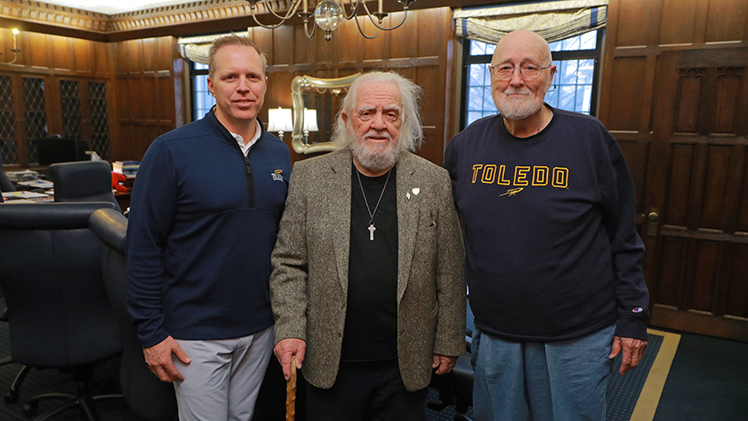The University of Toledo celebrated two longtime faculty members, Dr. Don Wedding and Dr. Seamus Metress, with a special lunch Friday, Dec. 20, with Interim President Matt Schroeder to recognize their decades of deep commitment and dedicated service to the University.
Wedding, an associate professor in the Department of Management in the John B. and Lillian E. Neff College of Business and Innovation, joined UToledo in 1968, and Metress, professor emeritus in the Department of Anthropology in the College of Arts and Letters, joined in 1969.

From left, Interim President Matt Schroeder; Dr. Seamus Metress, professor emeritus in the Department of Anthropology in the College of Arts and Letters; and Dr. Don Wedding, an associate professor in the Department of Management in the John B. and Lillian E. Neff College of Business and Innovation. Combine their time at UToledo and Wedding and Metress have been part of the Rocket family for more than 110 years.
Combine their time at UToledo and Wedding and Metress have been part of the Rocket family for more than 110 years.
“Don and Seamus have dedicated many years to The University of Toledo and we are grateful for their service. Their passion for our University is truly remarkable,” said Interim President Matt Schroeder. “The positive impact on the lives of many of our students and faculty over the decades is immeasurable.”
Wedding earned his bachelor’s and master’s degrees in chemical engineering at the University of Louisville and his juris doctor from American University. He received his MBA in finance and marketing at The University of Toledo in 1968, the same year he joined the University.
Since 1980, Wedding has served on numerous institutional committees including six terms as a member of the Faculty Senate, most recently from 2017 to 2020, and currently serves as vice president and grievance officer of the UToledo-American Association of University Professors; and has contributed research in dozens of scholarly publications. He also is a member of more than a dozen national and international organizations.
“It is an honor and privilege to have my picture published with my longtime friend, Seamus Metress, whom I greatly respect. We have been at UT for over 55 years and worked together on the organization of the AAUP faculty union in 1991. Seamus is retiring, but I will continue on. I am in my 57th year at UT. I have taught a full load of courses through the years and have taught over 30,000 students. Many of my former students are prominent in the community as doctors, lawyers, judges and successful business leaders. I am proud to be a UT faculty member. Go Rockets!”
Having earned his bachelor’s degree from the University of Notre Dame and his master’s degree from Columbia University, Metress joined UToledo in 1969 as a member of the then-Department of Sociology, Anthropology and Social Work. And in 1971 — the same year he received his Ph.D. from Indiana University — Metress initiated a degree program for anthropology as a major.
Metress’ fieldwork in the northern six counties of Ireland in the 1980s and 1990s, conducted with his wife, UToldeo Professor Emeritus Dr. Eileen Metress, generated professional presentations, articles and books. Metress and Eileen both received UToledo’s Outstanding Teacher Award, and in 2022, they were recipients of Ireland’s Cabhair Award, presented in Dublin.
Metress was designated as a UToledo Doermann Distinguished Lecturer, and earlier this month he was appointed by the Board of Trustees of The University of Toledo to the rank of Professor Emeritus.
“I loved my job. It was most rewarding for me to teach UT’s many working-class students,” Metress said. “So many of them went on to master’s and doctoral programs elsewhere and to rewarding, notable careers and fulfilling lives. I continue to have contact with so many of them even though they are now miles away, some in different parts of the world. I would be remiss if I didn’t mention the night classes, which were also a fixture of UT in former days. So many working adults from the community began or finished their academic programs at night; it was delightful working with them.
“Also, the interdisciplinary work done with colleagues from across the campus was not only fun, it was professionally rewarding. The cross-fertilization led to team-taught classes, joint cooperative academic degree programs, co-publications and a broadening of student learning,” he added. “The late historian and noted scholar, Dean Alfred Cave [in UToledo’s then-College of Arts and Science] was very supportive of my activist and political pursuits surrounding human rights issues — especially those involving Native Americans, Ireland and South Africa. I remain grateful to him for allowing me the applications of my values in the real world.”